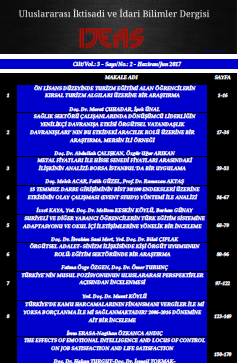İÇ DENETİM BAKIŞ AÇISIYLA SUİİSTİMAL RİSKİ YÖNETİMİ
Suiistimal, sahtekârlık ve yetkiyi kötüye kullanma ile nitelendirilebilecek hukuk dışı fiil olarak tanımlanmaktadır. Suiistimaller şahsi çıkarlarına menfaat sağlamak, sorumluluklardan kaçınmak veya şahsıyla ya da kurumla ilgili haksız bir kazanç elde etmek gayesiyle gerçekleştirilebilir. Araştırma ve inceleme kapsamında suiistimal riskleri yönetimi ACFE raporları temelinde ve iç denetim bakış açısıyla incelenmiştir. Suiistimal nedenleri, kırmızı bayraklar açıklandıktan sonra, suiistimalin önlenmesi için alınabilecek tedbirlere değinilmiştir. Yönetici ve yönetici adayları başta olmak üzere kamu çalışanlarının suiistimal riskleri yönetimini farkındalık seviyesinde bilmelerinin uygun olacağı değerlendirilmektedir. İç denetçiler, suiistimalin önlenmesinde en önemli faydayı iç kontrol sisteminin etkinliğine sağladıkları katkı ile gerçekleştirirler. İç denetçilerin, gerçekleştirdikleri denetimlerde iç kontrol sisteminin değerlendirilmesi ve ihtiyaç duyulan alanlarda kontrol önerilerinin sıralanmasının yanı sıra suiistimal riskleri konusunda da makul ölçüde ve profesyonel bir şüphe ile denetimi gerçekleştirmeleri önemlidir. Bu çerçevede çalışmanın amacı suiistimal riskinin tespitinde iç denetimin önemini irdeleyerek yazına katkı sağlamaktır.
Anahtar Kelimeler:
İÇ DENETİM, SUİİSTİMAL, İÇ KONTROL
FRAUD RISK MANAGEMENT FROM AN INTERNAL AUDIT POINT OF VIEW
Fraud is defined as an unlawful act that can be characterized by fraud and abuse of authority. Frauds may be done in order to benefit from their personal interests, to avoid responsibilities or to gain an unfair benefit from the person or organization. Within the scope of the research and investigation, fraud risk management was examined on the basis of ACFE reports and from the perspective of internal audit. Reasons for fraud, after the red flags have been announced, measures that can be taken to prevent abuse are mentioned. It is considered that public employees, especially managers and management candidates, should be aware of fraud risk management at an awareness level. Internal auditors achieve the most important benefit in preventing fraud with their contribution to the effectiveness of the internal control system. It is important for the internal auditors to evaluate the internal control system in their audits and to list the control suggestions where needed, as well as to perform the audit with a reasonable and professional suspicion about the risks of misconduct. In this context, the aim of this study is to contribute to the literature by examining the importance of internal audit in determining the risk of misconduct.
Keywords:
INTERNAL AUDIT, FRAUD, INTERNAL CONTROL,
___
- Association of Certified Fraud Examiners (ACFE). (2011). http://www.acfe.com/about-the-acfe.aspx, (Erişim Tarihi:05.03.2021).
- Association of Certified Fraud Examiners (ACFE). (2011). “2011 Fraud Examiners Manuel”, http://www.acfe.com/about-the-acfe.aspx, (Erişim Tarihi:08.01.2021).
- Association of Certified Fraud Examiners (ACFE). (2018). “2018 Global Fraud Study”, https : // www . acfe. com / rttn/docs/2018-report-to-nations.pdf,(Erişim Tarihi:03.04.2021).
- Church, B. K., McMillan J. J. ve Schneider A. (2001). “Factors affecting internal auditors' consideration of fraudulent financial reporting during analytical procedures”, Auditing: A Journal of Practice & Theory 20 (1), 65-80.
- Coram P., Ferguson C. ve Moroney R. (2006). “The Importance of Internal Audit in Fraud Detection”, Avustralya, 10-12. https://www.researchgate.net/publication/253527357,The Importance of Internal Audit in Fraud Detection, (Erişim Tarihi:09.12.2020).
- Çalışkan, A. ve Pekkan, N.U. (2019). Sağlık sektörü çalışanlarında tükenmişlik duygusunun işten ayrılma niyetine etkisi: Kişi-Örgüt uyumunun aracılık rolü. Business and Economics Research Journal, 10 (2), 469-481.
- Dunn, P. (2004). “The impact of insider power on fraudulent financial reporting”, Journal of Management 30 (3), 397-412.
- Institute of Internal Auditors (IIA). (2009). “Internal Auditing and Fraud Practice Guide”, https://www.acfe.com/uploadedFiles/ACFE_Website, (Erişim Tarihi:01/02/2021). İç Denetim Koordinasyon Kurulu (İDKK). http://www.idkk.gov.tr / Sayfalar / AnaSayfa.aspx, (Erişim Tarihi:10/02/2021).
- James, K. L. (2003). “The effects of internal audit structure on perceived financial statement fraud prevention”, Accounting Horizons 17 (4), 315-327.
- 5018 Sayılı Kamu Mali Yönetim ve Kontrol Kanunu, 25326 Sayılı Resmi Gazete, (2003). https://www.mevzuat.gov.tr, (Erişim Tarihi:10/03/2021).
- Marks, N. (2013). “Should Internal Audit Be Responsible for Detecting Fraud?” http://www.cmswire.com/cms/information-management/should-internal-audit-be- responsible-for-detecting-fraud-022085.php, (Erişim Tarihi:18/03/2021).
- Morgan, B. (2005). “Drying out fraud”, The Internal Auditor 64 (4), 111-115.
- Türkiye Ekonomi Politikaları Araştırma Vakf (TEPAV) (2015). “Yolsuzlukla Mücadele Mevzuatı ve Uluslararası Müktesebat”, https://www.tesev.org.tr/wp-content/uploads/rapor TESEVin Onerdikleri Yolsuzlukla_Mucadele_Mevzuati_Ve_Uluslararasi_Muktesebat.pdf (Erişim Tarihi:01/07/2020).
- Petraçcu D. ve Tieanu A. (2014). “The Rol of Internal Audit in Fraud Prevention and Detection”,Procedia Economics and Finance http://www.sciencedirect.com / science / article / pii/S2212567114008296, (Erişim Tarihi:03/03/2021).
- Pickett, K.H. (2012). “Fraud Risk Awereness Training (2nd Edition)-Fraud Smart, 59-67.
- Ramos, M. (2003). “Auditor’s Responsibility of FraudDetection”, Journal of Accountancy,http://www.journalofaccountancy.com/issues/2003/jan/auditorsresponsibilityforfrauddetection.html, (Erişim Tarihi:27/02/2021).
- Saka, T. (2001). “İç Denetim Mesleği, Bankacılık ve Risk Yönetimi”, TİDE İç Denetim Dergisi, Sayı:1, 22-38.
- Sökmen, U. (2009). “Kamu İdaresinde Soruşturma Kovuşturma”, T.C. Maliye Bakanlığı Strateji Geliştirme Başkanlığ Yayınları, 2009, 22-23.
- Teker, D. L. ve Ülengin, B. (2005). “Bankacılıkta Operasyonel Risk Ölçüm Modellerinin Türk Bankacılık Sektöründe Faaliyet Gösteren Bir Bankaya Uygulanması”, İTÜ Dergisi, Sayı 1, 154-169. Türkiye İç Denetim Enstitüsü (TİDE), https://www.tide.org.tr/page.aspx?nm=umuc, (Erişim Tarihi:15/03/2021).
- TURENG Türkçe İngilizce Sözlük (2006), http://www.tureng.com/tr/turkce-ingilizce/fraud, (Erişim Tarihi:03/08/2020).
- Uluslararası Suiistimal İnceleme Uzmanları Derneği (USİUD) (2007), http://www.usiud.org/index.php?ktg=nav&syf=main2, (Erişim Tarihi:13/03/2021).
- Wallace, W. ve Kreutzfeldt R. (1991). “Distinctive characteristics of entities with an internal audit department and the association of the quality of such departments with errors”. Contemporary Accounting Research 7 (2), 485-512.
- Yurtsever, G. (2006). “Bankacılıkta Personel Suiistimallerinin Önlenmesi ve Tespiti”, Active Dergisi, 46-49.
- ISSN: 2149-5823
- Başlangıç: 2015
- Yayıncı: Ömer TURUNÇ
Sayıdaki Diğer Makaleler
İÇ DENETİM BAKIŞ AÇISIYLA SUİİSTİMAL RİSKİ YÖNETİMİ
Muhammed TENŞİ, Ömer GİDER, Ertuğrul BAYER
KURUMSAL RAPORLAMANIN GELİŞİMİ: ENTEGRE RAPORLAMA
Burçak KIZILTAN, Deniz UMUT DOĞAN
ORGANIZATIONAL RESILIENCE PERCEPTION OF HEALTH CARE PERSONNEL DURING THE COVID-19 PANDEMIC
Deniz YÜKSEL, Birgül YABANA KİREMİT, Gizem Zevde AYDIN
COVID-19 DÖNEMİNDE İLAÇ DEPOSU YERİ SEÇİMİ: MERSİN ÖRNEĞİ
Ayhan DEMİRCİ, Özgür Uğur ARIKAN
İŞ YERI PERFORMANSINI ARTIRMADA BIR ÇÖZÜM ÖNERISI: FIZIKSEL AKTIVITE
